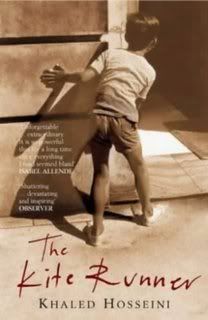THE KITE RUNNER
12:35:00 AM
If only I could turn back time, I would finish reading humurous novels first before reading The Kite Runner. By then, Khaled Hosseini could have broken my heart less.
The Kite Runner follows the story of Amir who, as a young child, grew up with good impressions of Kabul: tradition-centered cultural heritage, bold racial identity, deep blood ties, and being one of the Pashtuns (upper class) which secured him luxury and fortune. However, he has a father who thought of him as coward and unmanly enough. He has a Hazara (lower class) servant named Hassan who looks up to him. Sometimes though, Amir gets amazed by the wisdom and perseverance of Hassan who is unconditionally willing to save his life. This was highlighted by the narration that Amir's first word was "Baba" (father) while Hassan's was "Amir". When at one time something very wicked happened to Hassan, albeit seeing it through his own eyes, Amir kept himself hidden, finally realizing his cowardice and thus was unable to save Hassan. He could have stood up there and protect Hassan like what Hassan does whenever he is in trouble. Attached with that is the racism which prevailed. This is the novel's turning point. Everything changed then. Set against a backdrop of major historical events, Amir experiencing living turmoils during the fall of Afghanistan's monarchy through the Soviet invasion, almost losing his and his father's lives at the cumbersome and vast flight of refugees to Pakistan, having a hard life, late education and climactic marriage in the United States, and deciding to overcome his self-disappointment of his past at the rise of the Taliban regime, the book absolutely widens the readers' vision towards humanity.
The author succeeded in blending the drama with the context of the story in a very interactive and informative way. It is a story set in an interest-magnetizing culture that has become a bait for American attention since the September 11, 2001 terrorist attacks. While reading it, I felt like I was opening boxes of self-discovery, in which every memory, move or guilt is experienced thoroughly. What I appreciate best here is the strength of Amir's character while he does that something "to be good again" in saving a part of someone he has failed to save before, his father's will to equally share his love to the children who have his blood, and Hassan's loyalty to his promise to be always at the back of Amir, respecting him until his death. Though they suffered imperfections, they rose to claim redemption through other people. How sin should be atoned and contemplated to be finally redeemed in any manner possible is the best point in the universal theme this book has.
The most moving line here for me was: "There are a lot of children in Afghanistan, but little childhood." It must be very painful to escape childhood and think like someone twice your age. But the sweet simplicity of youthful winters spent kite running with Hassan, for Amir, seem light years away, illuminated by the kids' pure innocence. Even if this sometimes haunts Amir all his life, he loves this reminiscence. This paradox makes The Kite Runner a word of the mouth and life-changer. Something you will bring as a lesson as you live life everyday.#













0 comments